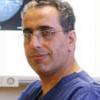Researchers are working on a simple new test for breast cancer that could be done even during routine dental check-ups. A team at the University of Texas is working on a rapid test to detect breast cancer using saliva. Dr Charles Streckfus says, "What we wanted was something that was safe, easy to collect, and could give you real time results." The potential test contains microchip technology that checks for proteins. Dr Streckfus says, "These proteins are in saliva, in every day existence. However, when in the presence of cancer their profile becomes altered." The level of the proteins is highly indicative. William Dubinsky, Ph.D., at the University, says, "If we can find one or more proteins that we can tell is markedly elevated or markedly depressed by the cancer, then that becomes a potential biomarker for the disease."
And for those who already have cancer, the proteins may tell if the treatment is working. The new test is almost ready to be submitted to the FDA for approval.
Prof Kefah Mokbel from London’s Princess Grace Hospital says: “This is a very exciting approach to breast cancer detection. It is accepted that individuals who harbour breast cancer have a different profile of proteins in body fluids such as saliva from those who do not. However such a test is still experimental and the protein profile is subject to genetic and physiological variations. Furthermore, several technological and analytical problems and pitfalls have to be surmounted in further studies focussed on the extensive qualitative and quantitative characterization of salivary proteins.”








